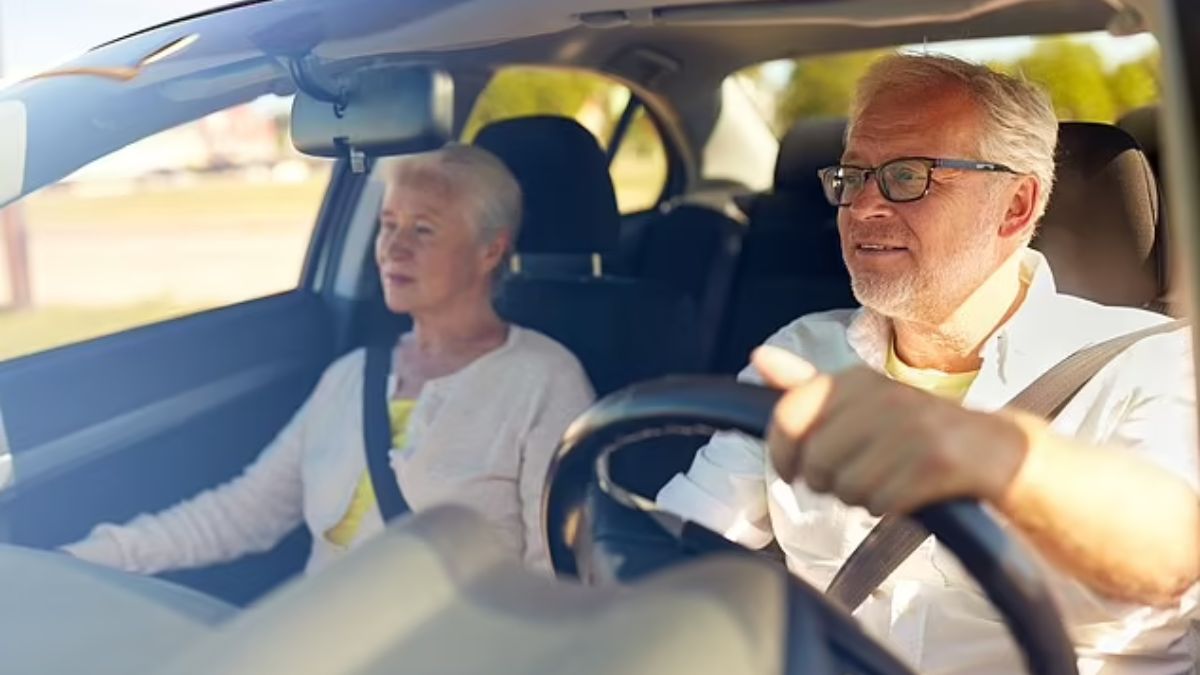From October 2025, millions of senior drivers across the UK will face major changes to the driving licence renewal process, marking one of the most significant reforms in decades. The New UK Driving Rule Change for Seniors, introduced by the government and enforced by the Driver and Vehicle Licensing Agency (DVLA), replaces the long-standing self-declaration system with a new, evidence-based medical verification process.
The move aims to strengthen road safety by ensuring that drivers aged 70 and above are medically fit to drive. While the changes promote safety and accountability, they also pose new challenges for elderly motorists, particularly those in rural areas who depend on their vehicles for daily life.
Understanding the New Rules at a Glance

| Aspect | Details | Impact on Drivers |
|---|---|---|
| Licence Renewal Cycle | Every 3 years for drivers aged 70 and above | Keeps regular health checks in place |
| Medical Proof Requirement | Mandatory GP assessments or medical evidence instead of self-declaration | Ensures accurate verification of driver fitness |
| Eye Test Certificate | Must provide certificate no older than 2 years | Confirms ability to meet legal vision standards |
| Health Checks | May include hearing and reaction-time assessments | Identifies age-related health issues that could affect driving |
| Renewal Fee | Renewal remains free | No direct financial charge for licence renewal |
| Indirect Costs | Costs for medical and eye tests (£20–£250) | Possible new expense for pensioners |
| Application Process | Online via GOV.UK or by post with full documentation | More preparation and planning needed |
| Safety Goal | Reduce accidents involving older drivers | Promotes safer roads for all users |
Why the Rules Are Changing
The UK government has introduced these reforms to address the rising number of senior drivers and the corresponding increase in age-related health issues that can affect driving ability.
Previously, drivers over 70 were only required to self-declare their fitness to drive — a system that critics said was outdated and unreliable. Many road safety organizations warned that self-assessment allowed potentially unsafe drivers to remain on the road without adequate checks.
Under the New UK Driving Rule Change for Seniors, the process becomes proactive and evidence-based, ensuring every renewal is backed by formal medical proof and regular eye examinations.
Stricter Medical Fitness Examinations
At the core of the reform is the introduction of mandatory medical verification. Instead of simply ticking a box, older drivers will now need to provide comprehensive health documentation, such as:
- A GP-issued medical report outlining overall fitness to drive.
- Specialist assessments for conditions like heart disease, diabetes, epilepsy, or neurological disorders.
- Additional tests requested by the DVLA, based on medical history.
The DVLA will also have expanded powers to cross-check data with NHS records to verify declared medical conditions, ensuring greater transparency and accountability.
This new evidence-based model is intended to identify early-stage impairments — such as deteriorating vision, slower reaction times, or mild cognitive decline — that might previously have gone unnoticed.
Mandatory Eye Test Requirements
Perhaps the most notable addition is the compulsory eye test requirement for all drivers over 70 renewing their licence.
- You must submit a certificate from a DVLA-approved optician, dated within the last two years.
- The test must confirm that you can read a number plate from 20 metres away and meet the minimum eyesight standards for driving.
- Renewal applications without a valid eye test certificate will be automatically rejected.
This new step is aimed at reducing the number of accidents caused by poor vision — one of the leading medical contributors to road collisions among older drivers.
Shorter Renewal Periods for Certain Conditions
For drivers with medical conditions that may affect driving, such as diabetes, stroke, or neurological illnesses, the DVLA may issue licences valid for only one or two years instead of the usual three.
This allows closer monitoring and ensures that health updates are reflected promptly in driving eligibility. While this increases administrative frequency, it provides an added layer of safety assurance for both the driver and the public.
How to Renew Under the New Rules
Renewal procedures remain familiar, but the documentation requirements are more extensive. The DVLA recommends starting the renewal process at least 90 days before expiry to avoid delays.
You will need:
- Proof of identity (passport or similar ID)
- Proof of address
- Eye test certificate (issued within the last 2 years)
- GP report or specialist medical documentation (if applicable)
- Completed D46P renewal form (by post) or online submission via GOV.UK
Tip: Schedule your medical and eye appointments early to ensure reports are ready before your renewal date.
Financial Implications for Older Drivers
While licence renewals remain free of charge, the associated medical costs introduce new financial considerations for many retirees.
Approximate costs include:
- Eye test: £20–£30
- GP medical report: £40–£90
- Specialist medical assessment: £100–£250
For pensioners on fixed incomes, these additional expenses could present challenges. Advocacy groups have urged the government to explore means-tested reimbursements or discounted medical services to prevent the rules from disproportionately affecting low-income seniors.
Safety and Compliance: Avoiding Penalties
The new rules are mandatory, and failure to comply carries serious consequences.
- Submitting incomplete or invalid documentation will result in a rejected renewal and an expired licence, meaning you can no longer drive legally.
- Failing to declare a medical condition that affects your driving could lead to a fine of up to £1,000.
- If that undeclared condition contributes to an accident, you could face criminal prosecution.
To stay compliant:
- Renew early (within 3 months of expiry).
- Be honest about your medical conditions.
- Keep all medical records organized and ready for submission.
Balancing Safety and Independence
For many senior drivers, especially those in rural or suburban communities, losing the ability to drive can mean losing independence and social connection. The government acknowledges this challenge and stresses that the reforms are designed not to restrict mobility, but to protect older drivers and other road users alike.
Maintaining the ability to drive safely supports both personal freedom and public confidence in senior motorists — a balance the government hopes this new system will achieve.
Reactions from Experts and the Public
Road safety organizations have widely welcomed the reform, calling it a “necessary modernization” of an outdated system. The Royal Society for the Prevention of Accidents (RoSPA) praised the move as a “responsible balance between independence and accountability.”
However, senior advocacy groups have expressed concern about the financial impact and the bureaucratic burden. They urge authorities to make the process accessible, especially for seniors without digital literacy or easy GP access.
Public sentiment remains mixed — with many acknowledging the safety benefits, while others fear the change could disproportionately impact rural retirees who rely heavily on their cars.
Preparing for the October 2025 Rule Change
To ensure a smooth transition under the new system, here’s what senior drivers should do now:
- Schedule an eye test before the October deadline.
- Consult your GP if you have existing medical conditions that could affect driving.
- Renew early to avoid last-minute delays.
- Keep your medical documents and test results ready for submission.
- Stay informed by checking official DVLA and GOV.UK updates regularly.
Being proactive will save time, reduce stress, and ensure uninterrupted driving privileges under the new system.
The Bottom Line
The New UK Driving Rule Change for Seniors, coming into effect in October 2025, marks a crucial evolution in how driver fitness is assessed. It replaces a trust-based system with one grounded in medical evidence, improving transparency and road safety.
While the new framework introduces added responsibilities and costs, it ultimately aims to preserve what matters most — safe, confident, and independent driving for older motorists. By preparing early and staying compliant, drivers over 70 can continue to enjoy their freedom safely and legally.
FAQs
1. What is the new UK driving rule change for seniors in 2025?
From October 2025, drivers aged 70 and over must submit medical proof and an eye test certificate to renew their licence, replacing the old self-declaration system.
2. Will I have to pay to renew my driving licence?
No. The renewal remains free, but you may incur costs for required medical reports or eye tests.
3. How often must I renew my licence after age 70?
You must renew your licence every three years, though drivers with medical conditions may face shorter renewal intervals.
4. What happens if I fail to provide medical evidence?
Your application will be rejected, and you cannot legally drive. Providing false or incomplete information can lead to fines or prosecution.
5. Why is the government introducing these rules?
The changes are intended to improve road safety by ensuring all senior drivers are medically fit, reducing accidents linked to health issues and poor vision.















